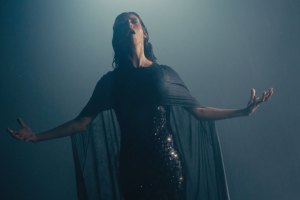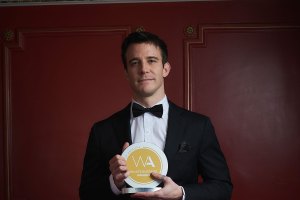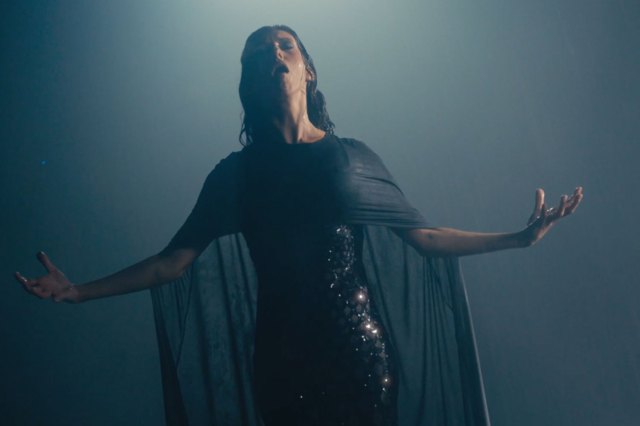Amanda Lawrence on… Jiggery Pokery
He was known to millions as the loveable clown in the Carry On films, directed by Gerald Thomas and produced by Peter Rogers, but underneath laid a very dark, tragic and lonely Charles Hawtrey.
Amanda Lawrence (Brief Encounter) is the actress – yes, actress – playing the role of the legendary eccentric in Jiggery Pokery – A Homage To Charles Hawtrey. Lawrence (as Paul Tsanos’ photograph shows) strikes an undeniable look of Hawtrey and will play him, and around eighty other parts, in this world premiere production at Liverpool’s Unity Theatre next month, before it heads on a national tour visiting venues in Bristol, Warwick, Newbury, Manchester and London.
How did you get involved with theatre and acting?
I always remember when I was at school wanting to make a play out of something. The best thing an actor can hold onto is to remember that quality when you were young and can be anything. I went to Bretton Hall College after school which is just outside Wakefield in the Henry Moore Sculpture Park. It’s a beautiful building within magnificent grounds – a really magical place. Unfortunately the drama department has now moved to Leeds University and the building I think is now used as a police training college.
You’ve since worked with theatre companies such as Kneehigh and Paul Hunter’s Told By An Idiot. Tell us about this?
After training at Bretton Hall College I started doing lots of Edinburgh Fringe work, working for no money, and then I worked for a company called Fecund and got to work for a company called Compass Theatre Company in Sheffield. Then I worked for the Theatre Centre, then Theatre Alibi, which is a great company, then Northern Stage, doing almost 15 months with them, before Kneehigh saw me and I got employed with them for five shows. Just before Kneehigh, however, I got a big break at the Royal Court in London’s West End. It was a co-production between Royal Court and Told By An Idiot and it was a play called Playing the Victim. It was fantastic meeting Paul Hunter and Hayley Carmichael, who founded Told By An Idiot with John Wright, and Playing the Victim was directed by Richard Wilson.
When did you first get told you looked like Charles Hawtrey?
I worked with Told By An Idiot again on a second show called the The Firework-Maker’s Daughter, which was a Christmas show at the Lyric Hammersmith. It’s a Philip Pullman story – a great family show – and in that I played a pirate. When we were doing the tech with all the light and sound I was surrounded by all these big guys as pirates and I was playing a confused pirate and I was short and thin with little glasses on, and one of them said, ‘Oh my god, you look like Charles Hawtrey’. So, there we were, all clowning around and playing – because we were silly pirates who kept getting it wrong all the time – and suddenly we were all falling about laughing at this observation.
Why do you think there hasn’t been a homage to Hawtrey on the stage before?
Maybe there has been before but I don’t know – I haven’t looked into it – but we originally called the piece ‘A Homage To Charles Hawtrey – A True English Eccentric’ and we were interested in that Tony Hancock type of figure – the tortured comedian – who was very funny, witty, and of the time, but has this very tragic soul underneath. With Charles Hawtrey, we always remember him as the one skipping around and saying seductively, ‘Ooh, hello’ which was all very harmless and light and wonderful, and yet he was a severe alcoholic who became very imprisoned by the public persona and became a very tragic, drunkard man and very lonely.
Hawtrey also wasn’t very popular towards the end of his life was he?
It was interesting when Paul Hunter, the director of Jiggery Pokery, and I went to visit Deal. We walked into a local pub where Charlie used to drink and when we told some of the people we were doing this play about him they said, ‘He was a horrible person’, and that he wasn’t very well liked at all. They were really quite hostile about him. But his mum suffered from senile dementia and – although I don’t know for sure – I think Charlie got it and suffered from the same thing in the end. Having said that he was abusive to people towards the end of his life and would often say, ‘p**s off’ to you.
What do you know about the circumstances surrounding Hawtrey’s death?
From what I’ve read I think he was brilliant and people have said he should have been doing Shakespeare and things like that, but I think he got stuck and imprisoned by the Carry On films and in an interview I’ve read, which he was very drunk when he did it, he kept saying, ‘They’ve ruined me’ or ‘They paid me bread’. He also smoked an incredible amount because he was a chain smoker and he gradually isolated himself in Deal, which is a place on the Kent coast. He didn’t have any family left at the time of his death, so hardly anybody went to his funeral, but I think Barbara Windsor sent flowers. I think he was happy being gay and loved men and that’s wonderful and something we want to celebrate in this piece. But he had a fall and when he went to the hospital they told him he basically had gangrene in both his legs and that they had to amputate above both his knees to save his life. And he said, quote, ‘I want to die with both my boots on!’ So, I think he died quite a painful death because he wouldn’t let them cut off his legs. It’s sad.
Hawtrey was of course famous for being in the Carry On films. Do you enjoy watching them?
There are some lovely scenes. There’s one involving Betty Marsden, Charlie, and Terry Scott, and they’re in a tent trying to get undressed in Carry On Camping and they end up getting into each others clothes and Charlie ends up in Betty’s frilly blue nightie. So, there are lovely moments like that, but the later films – like Carry On Abroad – are just horrible and, as my mum would say, are a bit crude. They’ve lost the original lightness and clever innocence.
How do you show Hawtrey’s dislike of the Carry On films in Jiggery Pokery?
Well, he couldn’t do anything else because of it. He was also paid appallingly, and they suffocated and imprisoned him. So, that’s the kind of thing we’re looking at. The public and the private. To show his haunting, for instance, he gets up one morning in his flat in Deal and pours a cup of tea to the sounds from the Carry On films and he’s hating it. Everything he does has a sound to it like a raspberry blowing or something else used in these films and he’s feeling haunted by this. We’re also looking at going into different places that you can in the type of theatre we’re doing, such as having him swimming in an ocean of vodka, which maybe you can’t do in straight theatre – whatever that is or means.
What else can audiences expect when watching Jiggery Pokery?
It changes all the time. He played Slightly in Peter Pan in the West End and we’re looking at that. We’re trying to emphasise it’s not a biography because I can’t be Charles Hawtrey, it’s not my Kenneth Williams or Alex Higgins, I am a woman, well, hopefully I am. So I don’t immediately play Charles Hawtrey, I play numerous roles – a cast of about eighty people – so I play different people all the time. I play, for instance, his mother almost more times than him. And I can’t do his voice either. But we look at him in Peter Pan and in the early Will Hay films, but they’re loads we miss out like his brilliant radio career. We also go into a big fantasy. Apparently, at one point, he was picked up by Laurence Olivier from Pinewood Studios and Paul and I were like, ‘I wonder what they talked about? – Charles Hawtrey and Laurence Olivier in Oliver’s chauffeur driven car!’ So, we were like, ‘Alright, let’s do it!’
It’s been said Hawtrey was most comfortable playing a woman. How will you feel playing the role of a man?
Well, as I mentioned, I’ve played a pirate before which was fun but never a full blown show as a man all the way through, but this is what is interesting because Hawtrey was so feminine. When you say to a woman, ‘play a man’ they might instantly speak in a gruff voice and sit open legged, but actually when you look around there are many men who are more lighter and more feminine than women and many women more masculine than men, so it’s not a black and white thing. This is one thing about Charlie he’s very female and when you put him in a dress in the Carry On films he doesn’t change his voice – maybe he does a little bit – but he still keeps a voice very close to him. So, for me, playing him is not a huge Dustin Hoffman leap.
What has fascinated you about Charles Hawtrey the person?
It’s lovely looking back at his life. He was a child star, a beautiful boy soprano, and we’ve got a recording of him which just sounds like a girl singing. And that really interested us. Also, he did loads of musical theatre – playing lots of women brilliantly – and would be down in the programme as Charlotte Tree. He would pull off his wig at the end causing complete and genuine shock because the audience couldn’t believe he was a man. In a lovely book by Roger Lewis called The Man Who Was Private Widdle he talks a lot about how, in the Carry On films, Charlie is most comfortable when he’s a woman. He’s not in drag like Sid James dressed up or Kenneth Williams even, but Charlie fits beautifully into and wears women’s clothes that immediately make him a woman like you see in pictures of him by Lee Miller. And we were interested in – Paul Hunter the director and I – a woman playing a man who is most free and most comfortable as a woman, which really excited me.
Is Hawtrey someone you would have loved to have met?
I think, now I’ve been reading about him, yes. I’m 38 years old and I remember the Carry On films being on the telly all the time when I was younger. So, for everyone in my generation, they’re in our psyche and what’s really fascinating about them is that different people from different classes, age groups or countries liked them and found them really funny. I saw them as a child but do remember getting to a certain point when I thought, ‘no, not for me’. I mean, when you look at them now, you see how sexual they are and the constant lines are naughty, but I didn’t see any of that when I was younger of course.
Would you like to see Jiggery Pokery turned into a film?
It’s interesting because in theatre there is so much freedom and magic. For example, I could become an aeroplane or a frog and the audience suspend their disbelief and go with me, it’s so wonderful and theatre is brilliant. In film, though, I don’t think I would want to do it because of what we’re exploring. I’m playing mostly other people other than Charlie and it’s about that – all the other people around him. There is of course Fantabulosa! starring Michael Sheen as Kenneth Williams and David Charles plays Charlie in that and was brilliant. I think what I’m doing is a theatrical thing: the tension of me being a woman playing a man who wants to be a woman.
What challenges would you like in the future after Jiggery Pokery?
I just want to work. I’m interested in all things but theatre is truly brilliant and an amazing world. Recently I’ve been doing a lot of radio which I’ve really enjoyed and I’ve been doing little bits of film and telly which I’ve really enjoyed because it’s different. So I think it’s really good to be doing different things and not stay in the same place. I’m up for anything but – as we all strive for – as long as it’s good work and work that keeps crafting me until the end, I’ll be happy.
Amanda Lawrence was speaking to Michael Hunt
Jiggery Pokery – A Homage To Charles Hawtrey opens at the Unity Theatre on Wednesday 11 November and runs until Saturday 14 November. Tickets cost £6-£9.
Following its world premiere in Liverpool, the production will visit Bristol, Warwick and Newbury before arriving to Manchester’s Royal Exchange Studio for three nights. The production will then transfer to London’s Battersea Arts Centre for three weeks in December.
*Photograph taken by Paul Tsanos












